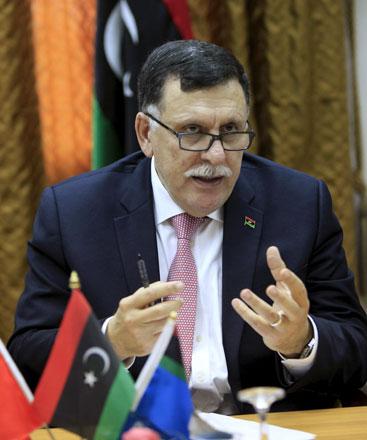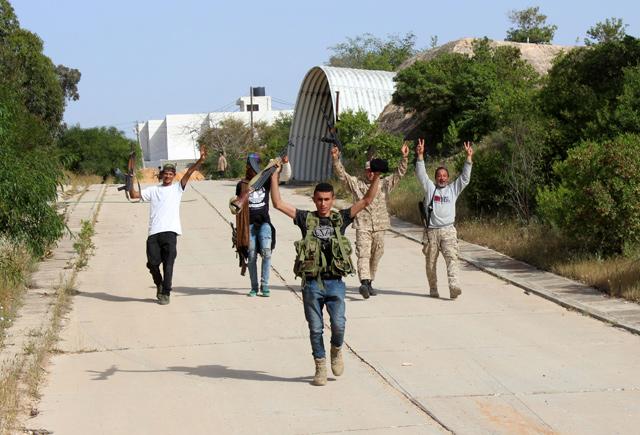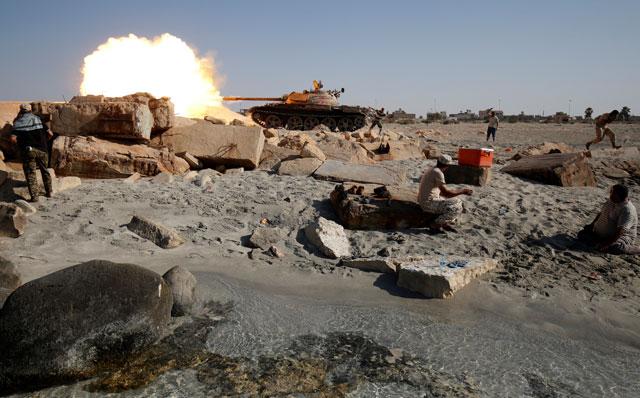You are here
Libyan unity gov’t starts work from ‘secured’ Tripoli naval base
By Reuters - Mar 31,2016 - Last updated at Mar 31,2016

Fayez Seraj, Libyan prime minister-designate under the proposed unity government, attends a meeting with officials of municipal council of Tripoli in Tripoli, Libya, on Thursday (Reuters photo)
TRIPOLI — Libya's UN-backed unity government held meetings at a heavily guarded naval base in Tripoli on Thursday and a senior military official said it was working to secure state institutions in the capital.
The government's leaders arrived at the naval base by ship from Tunisia on Wednesday in a high-risk bid to take power, after being prevented from flying in when opponents closed down Tripoli's airspace.
The capital has been mostly calm since their arrival, though a TV station that supports Tripoli's separate, self-declared National Salvation government was taken off air late on Wednesday and there were brief clashes close to the city centre.
On Thursday, members of the unity government and its seven-member presidential council held meetings with local council leaders at the naval base. Abdulrahman Taweel, a brigadier general in charge of organising protection for the new government, described the base as "completely secured".
"We are working to secure all other state institutions," he told Reuters, without elaborating. "The council is here to stay and to continue their work here in Tripoli. They will not leave except for international meetings and will return."
The presidential council and the Government of National Accord (GNA) emerged from a UN-mediated deal signed in December.
Western powers hope they will be able to request and channel foreign support for confronting Daesh and tackling migrant flows from Libya towards Europe.
They have recognised it as Libya’s sole legitimate government and called for a rapid transfer of power, but both the National Salvation government and a rival administration in the east have rejected this.
Need for broader support
Critics have questioned how the GNA will be able to start governing without winning broader support and securing a long-sought vote of approval from Libya’s internationally recognised parliament in the east.
Tripoli is home to a complex web of armed groups, some of which brought the National Salvation government to power in 2014.
Several powerful brigades have pledged support for the GNA, but others have either not declared their loyalties or have said they will oppose it.
Taweel did not say which brigades were working for the GNA, but said it was receiving protection from the army, military intelligence and police.
He said GNA ministers originally from Tripoli were “not under threat and even move around without security”.
The GNA’s backers argue that as it establishes a presence on the ground, armed groups and public opinion will coalesce behind it and hardline opposition will fade.
“If they can get control of the country’s finances then power brokers who have been sitting on the fence will come in behind them,” said a senior Western diplomat.
However, the GNA’s leading public adversaries in Tripoli have so far kept up their vocal opposition.
In a statement late on Wednesday National Salvation government head Khalifa Ghwell called the presidential council “infiltrators”, and said he was giving them a last chance to “leave or surrender”.
Libyan Grand Mufti Sadiq Al Gharyani, an influential figure among some of Tripoli’s armed groups, called for the UN-brokered deal to be revised, and for the GNA to leave the country “before we open the door of jihad on them”.
Related Articles
TRIPOLI — On March 30, Libya’s prime minister-designate Fayez Al Sarraj sailed into Tripoli under naval escort and set up the headquarters o
TRIPOLI — Forces loyal to Libya's unity government announced Saturday a counterattack against military strongman Khalifa Haftar's fighters,
SIRTE, Libya — Libyan pro-government forces battled to seize more territory from Daesh militants in their stronghold Sirte on Wednesday but













